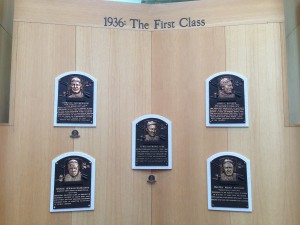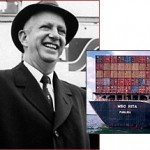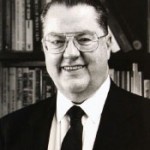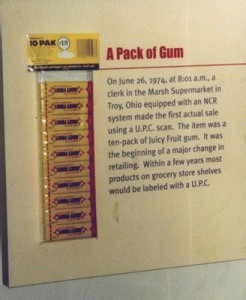My boys turned 8 and 11 this past May, and for their birthdays my wife and I promised them a trip to Cooperstown, NY to visit the Baseball Hall of Fame. Their dream (and mine) came true this past Friday when we packed the car and made the pilgrimage to upstate NY.
We spent the entire day on Saturday at the Hall of Fame, slowly walking through the various exhibits, taking pictures and reading about all the greats who have played the game. We eventually ended up at the Plaque Gallery, where bronze plaques of the game’s greatest players, managers, umpires, and executives hang on oak-lined walls. Seeing the plaques of some of my favorite players as a kid — Reggie Jackson, Ozzie Smith, Cal Ripken, Jr., Wade Boggs, Gary Garter — brought back great memories of trading baseball cards with my cousins and listening to Mel Allen exclaim “How about that?!” on This Week in Baseball every Saturday afternoon.
In the words of my sons, the trip to Cooperstown was “awesome” and the “best birthday present ever.”

Yesterday I went to New York City to visit a client, and on the train ride back to Boston (which was supposed to take 3.5 hours but instead took 6 hours because of engine problems), a question popped into my head: If there was a Supply Chain and Logistics Hall of Fame, who would be inducted into the first class?
While you can trace the origins of supply chain and logistics to ancient times, I chose 1940-1980 as the beginning of the “modern era” of the industry, and so I limited my candidate choices to that time period.
Here are two of my candidates so far:

Malcom McLean, the North Carolina trucker who invented container shipping in 1956. Although it took more than a decade for containerized shipping to gain traction, aided in part by the Vietnam War, the container ultimately served as the catalyst and key enabler for global trade. In his book The Box: How the Shipping Container Made the World Smaller and the World Economy Bigger, economist Marc Levinson writes:
Malcom McLean turned containerization from an impractical idea into a massive industry that slashed the cost of transporting goods around the world and made the boom in global trade possible…By making shipping so cheap that industry could locate factories far from its customers, the container paved the way for Asia to become the world’s workshop and brought consumers a previously unimaginable variety of low-cost products from around the globe.
McLean was featured in the PBS television series They Made America about “the extraordinary innovators whose ideas and entrepreneurial spirit gave birth to landmark advances.” Here is an excerpt from the PBS biography about McLean:
Malcom McLean was born into a North Carolina farming family in 1914. Struggling to assist his family during the Great Depression, he started a small trucking company to transport farmers’ goods and supplies. His resourcefulness enabled him to expand to thirty trucks by 1940, and he was eventually able to sell McLean Trucking, a $12 million company with over 1700 trucks, by the mid-1950s.
His years in the transportation business showed McLean the need for an easier method of shipping goods. He had watched dock workers unloading goods from trucks and transferring them to ships, and marveled at the inefficiency of the process. “Wouldn’t it be great,” he asked himself, “if my trailer could simply be lifted up and placed on the ship?” In 1955, he gambled big on a container venture, buying two oil tankers and securing a bank loan to buy $42 million worth of docking, shipbuilding, and repair facilities. He refitted the ships and designed trailers to stack below or on the decks. In April 1956, his first container ship, the Ideal X, departed Port Newark, New Jersey, headed for Houston.
Malcolm McLean died in 2001, and although he’s not a household name, his impact on supply chain management is equivalent to Babe Ruth’s impact on baseball.

My second candidate is George Joseph Laurer, who is generally credited with inventing the Universal Product Code (UPC) in 1973. Like many inventions, his work was a collaborative effort and build upon the ideas and innovations of others, including Bernard Silver and Norman Joseph Woodland, graduate students at Drexel Institute, who filed a patent application in 1949 for the “Classifying Apparatus and Method,” which they described as “article classification…through the medium of identifying patterns.”
Nonetheless, it was Laurer’s leadership and focus at IBM that ultimately led to the successful creation and deployment of the UPC — which is what makes inventory management and so many other supply chain and logistics processes possible today.
According to Wikipedia:
Around 1970, IBM at Research Triangle Park in North Carolina assigned George Laurer to develop a supermarket scanner and label. In February 1971, Heard Baumeister joined Laurer then later William Crouse joined the effort…A change in management at IBM resulted in Baumeister, Crouse, and Laurer being assigned to different departments. Laurer was given sole responsibility for inventing and creating a viable code and symbol that would satisfy all the requirements.
Laurer spent 36 years at IBM and holds 25 patents. He received IBM’s Corporate Technical Achievement award in 1980 for his work on the UPC, and he was inducted into The Clark School Innovation Hall of Fame in 1991.
Of course, if Laurer were to get inducted into my imagined Supply Chain and Logistics Hall of Fame, his exhibit would need to include the very first UPC-labeled item scanned at a supermarket: a 10-pack of Wrigley’s Juicy Fruit gum purchased by Clyde Dawson at Marsh’s Supermarket in Troy, Ohio on June 26, 1974. The item is currently on display in the Smithsonian Institute, but I’m sure they’ll let us borrow it.

So, what do you think of my candidates? Who would you nominate for the first class of the Supply Chain and Logistics Hall of Fame? Post a comment and share your ideas!









